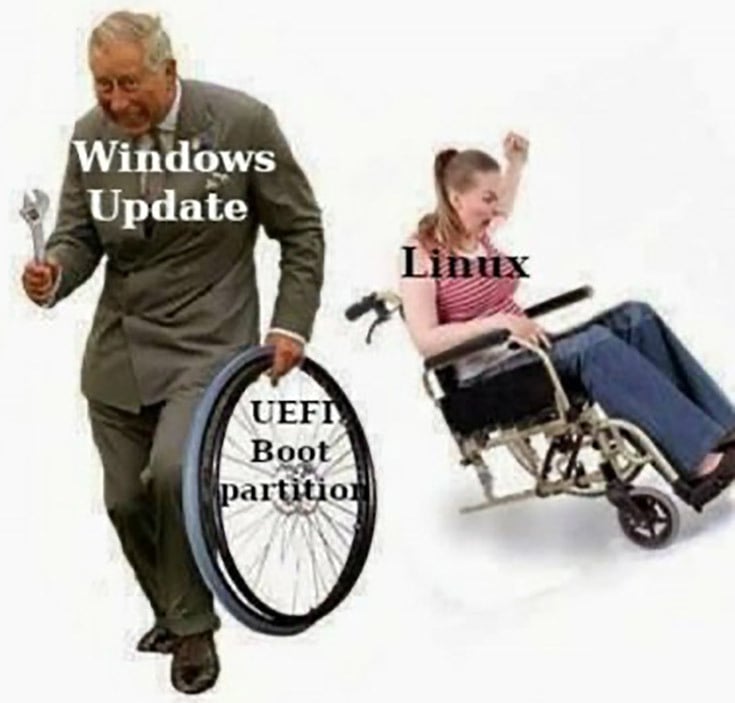this post was submitted on 24 Jan 2025
491 points (95.9% liked)
Actually Infuriating
740 readers
711 users here now
Community Rules:
Be Civil
Please treat others with decency. No bigotry (disparaging comments about any race, ethnicity, religion, gender, sexuality, nationality, ability, age, etc). Personal attacks and bad-faith argumentation are not allowed.
Content should be actually infuriating
Politics and news are allowed, as well as everyday life. However, please consider posting in partner communities below if it is a better fit.
Mark NSFW/NSFL posts
Please mark anything distressing (death, gore, etc.) as NSFW and clearly label it in the title.
Keep it Legal and Moral
No promoting violence, DOXXing, brigading, harassment, misinformation, spam, etc.
Partner Communities
- Mildly Infuriating
- Furiously Infuriating
- Memes
- Political Memes
- Lemmy Shitpost
- Not The Onion
- You Should Know
- Lemmy Be Wholesome
founded 7 months ago
MODERATORS
you are viewing a single comment's thread
view the rest of the comments
view the rest of the comments

Safest thing to do is run windows only in a VM or container with Linux as the host OS and pass the hardware required in. Windows actually runs better this way and can't mess with your Linux install.
How does it run better?
I've avoided it specifically for performance reasons, this is new to me, for one program that WINE doesn't like.
Linux manages disk access way better than Windows.
But anything that depends on CPU, memory, or IO lattency will get slower.
I've not actually benchmarked it. Although others have and I couldn't really tell you why but windows spends a lot less time and resources trying to manage itself when it's in a VM or container. It's just much snapier and even when passing in a GPU to play games it preforms well.
None of this has ever been my experience
AFAIK Virtualization is very Dependant on hardware. Some processors are not optimized for virtualization at all so even if you have great video cards or anything the virtualization could still run like shit for you and run seamlessly for someone with less specs. Don't ask me which ones are good I learnt this the hard way while trying to use a celeron to run a VM.
Well, to some degree I'm sure you're right. But the thing is, I've used VMs off and on for at least 15 years on AMD, Intel, and ARM cpus. My universal experience has been that software running within those VMs, even on an incredibly fast host machine, runs so slow it's painful. I have mostly used VirtualBox which I know a lot of people hate but it's been the only one I have found that usually "just works". So I dunno. If you have a better suggestion for a VM host that runs fast on linux (x86) I'd love to hear it because I'm currently trying to permanently ditch windows and VMs could be a part of that because I do want access to Photoshop and a few other Adobe apps. But thusfar when I've tried that, the slowness has been unbearable.
I ran a virtualbox vm too but for installing an old game I want to scavenge the resources from. It went so slow that I ended installing atlas on another laptop just to have have it done "this day". So I don't have many suggestions sorry XD. I ditched the photoshop too for gimp so there is barely a "turning back". Most of the games that I wan to play seems to work in linux anyway.
Oh ok. I thought you were saying you had better performance on windows on VMs so I was just wondering if I had missed that due to the host software or something
If you aren't gaming, you don't care about performance past giving CPU/RAM enough resources to VM.
If you are multiplayer gaming and unwilling to give it up or be very tech savvy, VM isn't an option.
Well maybe, see: https://looking-glass.io/
If you single player game, you just need pcie passthrough to your VM.
Those resources are the concern. Yes, a VM works fine, but works better than native windows? That's where my question is.
Also, I care a lot about performance if I'm running my system on a potato.
Expect at least a 20% performance hit with a hypervisor compared to bare metal
"That's not how anything works" meme material right here.
How can literally anything run better on a vm compared to physical?
To understand why windows runs better in a vm or container, you'd have to understand how the windows kernels work... And that means understanding how all the code from every previous Windows kernel that is still in windows 11 works. Since they never did a full rewrite. For example you'd have to understand why blue screens of death happen, and how windows telemetry works, what code from windows 3.1 still exist, and what windows 11 really does when it tries to serve you ads. I'm not qualified, and as far as I can tell no one at Microsoft is either.
I know your wrote some kind of gotcha but you really should try it and see for yourself if you actually need windows for anything. At a minimum I guarantee it's more stable.
This is the way.
There are currently [2] Satyah Nadellas downvoting but
This is The Way